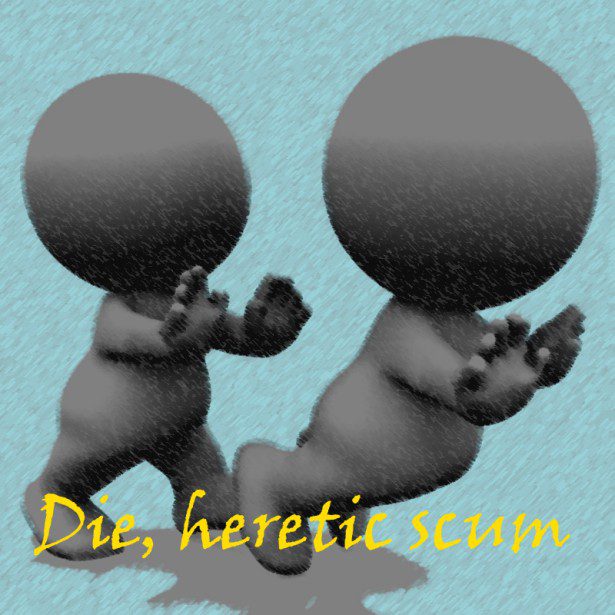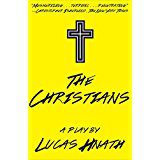 The vote supports Pastor Paul, but it doesn’t take long for Pastor Joshua’s new church, affirming the reality of hell, to drain the mother congregation.
The vote supports Pastor Paul, but it doesn’t take long for Pastor Joshua’s new church, affirming the reality of hell, to drain the mother congregation.
I saw The Christians on Sunday. Lucas Hnath wrote this play about Pastor Paul, a man who had skillfully grown his church from a tiny storefront to a huge megachurch, complete with coffee shops and bookstore. Suddenly, he announces to his congregation that his core theology has changed.
He no longer carries as assurance that God will cast all who have not acknowledged Jesus as Lord and Savior into hell. In fact, he no longer believes in hell at all.
He picks the Sunday morning where the 20-year-old congregation celebrates the final payment of the building debt to announce that his theological shift.
He offers the moving story of a young, non-believing Arab boy who saves his sister’s life from a burning building but who himself burns to death with the act. Pastor Paul then explains that he no longer believes that God would send that courageous loving young man to eternal punishment.
By so doing, he stands in firm opposition to what his congregation believes. His associate, Pastor Joshua, a young, fire-breathing, hell-preaching, charismatic and likable young man, comes to the pulpit to offer prayer and then . . .
Well, he calls for an immediate congregational vote to see who will support Pastor’s Paul’s new direction. The vote supports Pastor Paul, but it doesn’t take long for Pastor Joshua’s new church, affirming the reality of hell, to drain the mother congregation.
People really do prefer hell for the outsider. However, the bigger question became, “Can I believe to be truth what I think I’m hearing from God?”
The core of the issue surfaced with these words: “If you really believe what you say you believe, you are not my brother.”
 I watched this brilliantly written and acted play (Kalita Humphries Theater, Dallas, now through February 19) display in 90 minutes the conundrum that has faced humankind from our earliest religious issues.
I watched this brilliantly written and acted play (Kalita Humphries Theater, Dallas, now through February 19) display in 90 minutes the conundrum that has faced humankind from our earliest religious issues.
How much room is there for dissenting views when all of us are sure we are hearing the Lord God speak to us?
Can the same God actually speak differently to different people?
Which texts of Scripture will be the primary ones to support what we think we are hearing? Which ones will we ignore or downplay?
I watched and saw it through the eyes of one who believes the United Methodist Church will soon splinter because we too, say, “If you really believe what you say you believe, you are not my brother.”
The joke is on us
The following was considered the best Christian joke ever from a 2005 survey.
I was walking across a bridge one day, and I saw a man standing on the edge, about to jump. I ran over and said: “Stop. Don’t do it.”
“Why shouldn’t I?” he asked.
“Well, there’s so much to live for!”
“Like what?”
“Are you religious?”
He said: “Yes.”
I said: “Me too. Are you Christian or Buddhist?”
“Christian.”
“Me too. Are you Catholic or Protestant?”
“Protestant.”
“Me too. Are you Episcopalian or Baptist?”
“Baptist.”
“Wow. Me too. Are you Baptist Church of God or Baptist Church of the Lord?”
“Baptist Church of God.”
“Me too. Are you original Baptist Church of God, or are you Reformed Baptist Church of God?”
“Reformed Baptist Church of God.”
“Me too. Are you Reformed Baptist Church of God, Reformation of 1879, or Reformed Baptist Church of God, Reformation of 1915?”
He said: “Reformed Baptist Church of God, Reformation of 1915.”
I said: “Die, heretic scum,” and pushed him off.
In the next two to three years, the epithet “Die, heretic scum” will be tossed like a grenade at the “opposition” side in the UMC. “Opposition” of course, is defined by “the person who does not agree with me on whatever core issue I am basing my faith upon.”
Whoever does the labeling will stand on the surety that God has spoken clearly and unambiguously. That surety permits one to condemn another to separation, both in the present from one another, and in eternity, from God and the fully redeemed community.
And so, we persist in proclaiming that we ourselves are God, capable of deciding who does and who does not get to claim citizenship in the Kingdom of Heaven.
Yes, we are The Christians.













